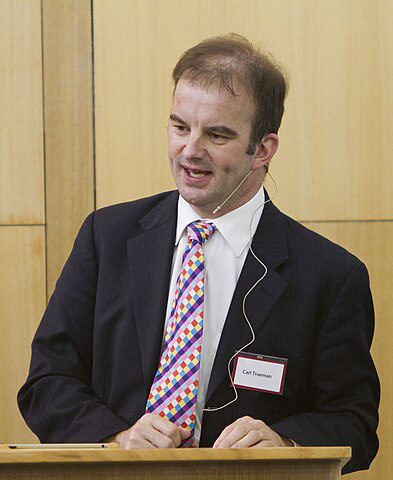In the course of writing about Ayaan Hirsi Ali’s conversion to Christianity–which we blogged about–Carl Trueman raises an important point about “instrumentalizing the gospel“; that is, using Christianity as the means to an earthly end.
He rejoices about her embrace of Christianity and doesn’t doubt it for a minute, though he wishes that in her announcement she had said more about Jesus, recognizing that, as she says, she is still learning and growing in her new faith. The ex-Muslim activist says that she has turned away from her atheism to Christianity because she now believes that mere secularism will not have the resources to preserve Western Civilization against the challenges that threaten it: militant Islam, Chinese Communism allied with Vladimir Putin’s Russia, and the woke ideology that threatens to destroy our civilization from within.
Trueman doesn’t dispute that, but he observes that there can be a danger in accepting Christianity in order to preserve Western Civilization or any other good cause. This, he says, is what liberal Protestantism tries to do [my bolds]:
There is a challenge here for Christianity: the perennial problem of the connection between the transcendent and the immanent, too often resolved in church history by instrumentalizing the gospel in the service of social activism. This has always been the vulnerability of liberal Protestantism, with its traditional support of the dominant moral consensus. Whether beating the drum for anti-communism in the 1950s or flying the rainbow flag from the church steeple in the 2020s, liberal Protestants do not so much offer prophetic criticism of secular power as provide a religiously informed idiom for its expression. The current progressivism, committed to the disruption of all stable categories, is a far more complicated creature to express through a Christian idiom—which means that much more of the traditional language needs to be jettisoned. Man and woman. God as Father. Jesus as male. All of these tenets offered little or no threat to anti-communism, but they cut into modern identity politics. And all speak to the lack of any sense of the transcendent, indeed any sense of the sacred, in liberal forms of Christianity.
That is a trenchant critique of liberal theology! But Trueman then cautions lest conservative Christians do something similar to advance conservative causes:
Liberal Protestantism is dying, however, with mainline denominations fracturing and disintegrating at a striking rate. And today, we must also be careful that the truth of the gospel is not instrumentalized in the service of a different cultural campaign—even, for instance, a cause as worthy as that of opposing the leftist culture warriors who seek to overturn everything from parenthood to women’s rights. The most striking omission in Ali’s testimony is the one thing necessary to prevent such: a sense of the transcendent. God does not exist because he is useful for combatting wokeness or any other threat to Western civilization. He is useful because he exists, in holiness and transcendence.
Yea, verily.
And yet, it seems to me that what Ali was describing was not a scheme to use Christianity to bring back Western Civilization; rather, the apologetic line of thought that led her to Christianity. She came to see the limits of Islam. Then she came to see the limits of atheism. She tells about reading Tom Holland’s Dominion: How the Christian Revolution Remade the World. That Christianity, in effect, created Western Civilization–especially when you compare that to the civilizations that Islam and atheism created–is evidence for its superiority as a worldview, which may, in turn, argue for its truth.
Ali explicitly says that her “embrace of Christianity” is not simply part of her agenda to help save Western Civilization. Nor even a merely intellectual conclusion. It is personal. She writes,
Yet I would not be truthful if I attributed my embrace of Christianity solely to the realisation that atheism is too weak and divisive a doctrine to fortify us against our menacing foes. I have also turned to Christianity because I ultimately found life without any spiritual solace unendurable — indeed very nearly self-destructive. Atheism failed to answer a simple question: what is the meaning and purpose of life?
It certainly isn’t instrumentalizing the Gospel to believe in Christ in order to find “spiritual solace,” or to find a way out of a “self-destructive” life. The wreckage wrought by the law leads us to the gospel.
“Of course, I still have a great deal to learn about Christianity,” she admits. “I discover a little more at church each Sunday.” This sounds like she’s at the right place.
I wish I knew what church she goes to. She is now a United States citizen. She does not proclaim her whereabouts, since she is on numerous jihadist hit lists. But I daresay she does not go to a church with an instrumentalized gospel. The actual gospel of Christ crucified for sinners is what we all need. And, ironically, that gospel, non-instrumentalized, is the only one that accomplishes the other purposes.
Photo: Carl Trueman by Blarneytherinosaur – Own work, CC BY-SA 3.0, https://commons.wikimedia.org/w/index.php?curid=132954348














